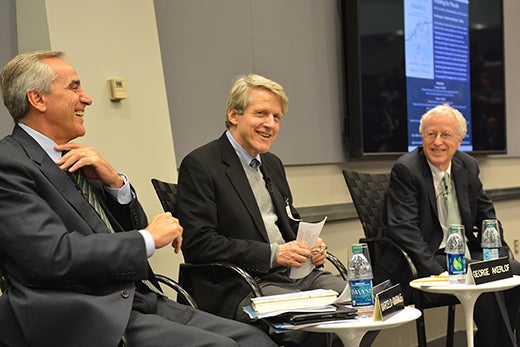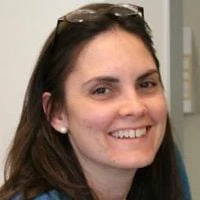
and George Akerloff at the World Bank on October 19.
Photo: Nazanine Atabaki.
The premise that free markets can both promote and harm our well-being is no news. Externalities are the stuff of Economics 101. But the authors add to the ever-expanding pantheon of literature on behavioral economics with a compelling twist on the concept that capitalism’s consequences are ambiguous—backed by real world examples, good storytelling, and loads of research references and footnotes.
But first, don’t get them wrong, they do not think free markets are bad. (Something they repeated multiple times during their presentation, and in the book.) Markets incentivize and reward innovation and promote prosperity. It’s just that they create this other economic equilibrium. One that, as they write in the book, “is highly suitable for enterprises that manipulate or distort our judgment, using business practices that are analogous to biological cancers that make their home in the normal equilibrium of the human body.”
Why? Because we have “monkeys on our shoulders.” In other words, we are human: we want to be liked, we are averse to loss, we want to follow others, and so on. “Pareto optimal,” is not really optimal, as long as we have needs that can be exploited. How else to explain the proliferation of decisions and outcomes that “NO ONE COULD POSSIBLY WANT.” The all-caps emphasis is theirs.
“Insofar as we have any weakness in knowing what we really want, and also insofar as such a weakness can be profitably generated and primed, markets will seize the opportunity to take us in on those weaknesses… they will phish us for phools,” Akerlof and Shiller wrote. The authors use the word “phish” —coined in the 90s to mean deceptive internet fraud—as a metaphor for “getting people to do things in that are in the interest of the phisherman, but not in the interest of the target.” Phools are the people who are phished.
Where there is freedom to choose, Akerlof and Shiller say, there is freedom to phish.
But what is an outcome THAT NO ONE COULD POSSIBLY WANT? Take gambling, around which cha-chings a 24/7 supply-meets-demand industry. Who says to herself in the morning, “Hey, I want to be so addicted to slot machines that I become dulled to every real joy in life?” No one. But gambling addiction is a sad and pervasive reality, created by our weaknesses and the market’s response to them.
In their book, the authors show how the tobacco, alcohol, credit card, food, pharmaceutical and other industries routinely phish us for phools. They explain the concept at work in the U.S. savings and loans crisis in the early 90s, the 2008-09 financial crisis, and in U.S. politics.
The pair took a casual approach during their Bank presentation: no PowerPoint, they just sat and mused, giving the impression of two amiable, long-time academics, rousing muted chuckles here and there from the audience with their quips. Shiller said that the idea of the book came from the advertising on cat food. He wanted to see if the “beef stroganoff” and “foie gras” varieties he bought for his cat would deliver on their promises. So he tasted the cat food, which, tasted, well, like cat food. “I thought to myself, there is something going on here,” Shiller said with a wry smile.
Advertisers aren’t inherently evil either, both authors emphasized, and they don’t read our minds. They have the goal to sell, and use trial and error in different geographic markets to see what works. They tell stories to capture our mental frames so we’ll graft our stories on to theirs, Akerloff said. “We are living in a world which has a lot of human thought put into it,” said Shilller.
So is there any hope amid all this trickery? Yes, the authors said. As humans we live in communities of people who care for each other. For Akerloff and Shiller, the real heroes are the founders of better business bureaus, chambers of commerce, consumer protection agencies, and yes, the public servants and regulators who have worked and fought for the common public good—starting in the late 19th century when the ills of the industrial economy started to become apparent. “We are in favor of civil society in which people feel responsible, a community that feels responsible, and a government that acts as our servant,” Akerloff said.
But here’s the rub: how does this author, right now, avoid those free, left-over chocolate-chip cookies in the hallway of her office? We certainly don’t need to be purposefully phished in order to be real fools.


Join the Conversation